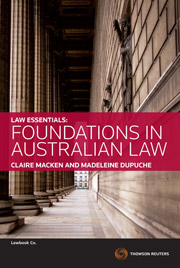
Law Essentials: Foundations in Australian Law - Book
|
Book $70.00 RRP |
Date: 28/10/2011 Code: 9780455228969 Thomson Reuters, AUSTRALIA |

Law Essentials: Foundations in Australian Law - Book
Price: $70.00
|
Available Formats
| Format | Title | Date | Code | Price | |
|---|---|---|---|---|---|
| Book | Law Essentials: Foundations in Australian Law - Book | 28/10/2011 | 9780455228969 | $70.00 |
Add to cart

Law Essentials: Foundations in Australian Law - Book
Price: $70.00
|
Description
This is a textbook written especially for first year LLB students. It is intended to be a complete resource for students commencing a law degree in Australia and to be used in foundational law units offered in Australian universities for first year LLB students.
The textbook will give students insight into the operation of the Australian legal system and law making in Australia as well as guidance on skills such as legal reasoning, researching and writing which they will need to develop in order to successfully navigate their law degree. Students will gain an understanding of the requirements and process for admission to practice as an Australian lawyer as well as tips for developing fundamental skills for surviving and thriving as a law student.
In short, the text will comprise a dual focus of knowledge and skills to equip first year students with a solid foundation for their law studies.
Following on from the work of the ALTC Discipline Scholars in Law in drafting Threshold Learning Outcomes (TLOs) for the LLB, the Council of Australian Law Deans is in the process of adopting 6 teaching and learning outcomes (‘TLOs’) to be recognised Australia wide as the overarching goals for all LLB courses. These TLOs are based on the knowledge and skills requirements stated in the Australian Qualifications Framework (AQF), the minimum standard required for a Bachelor of Laws degree in Australia.
The text will be structured in line with the TLOs to make obvious links between the TLOs and content, thereby making it easy for teaching staff to facilitate engagement with the TLOs amongst their first year students.
Features
- The textbook will combine content from various texts previously published by Thomson Reuters to create an all-encompassing first year textbook (as a ‘custom text’)
- Different author ‘voices’ will be pulled together with one voice in ‘summary’ pages, checklists, easy to reference information and consistent key terms throughout the entire custom book
- Based on the national minimum Threshold Learning Outcomes for Law (agreed standards to be endorsed by the Council of Australian Law Deans) and integrating knowledge content as well as skills, including practical skills
- Features such as the ‘voice of the profession’ , case examples etc - using different areas of legal practice to explain the importance of statutory interpretation, legal reasoning and method, studying law and law in society
- Complimentary linked online teaching resources based on first year best practice and pedagogy.
You Might Also Like
-
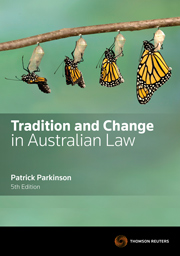
Tradition and Change in Australian Law Fifth Edition - Boo...Book
$122.00
-
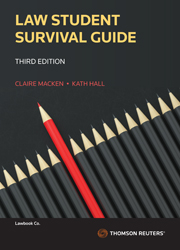
Law Student Survival Guide Third Edition - BookBook
$48.00
-
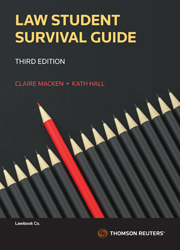
Law Student Survival Guide Third Edition - Book & eBookBook+eBook
$65.00
-
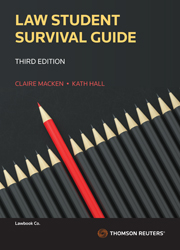
Law Student Survival Guide Third Edition - eBookeBook - ProView
$48.00
Table of Contents
1. Origins of the Australian Legal System and the Constitutional framework
2. Sources of Australian Law
3. Legal Institutions and their processes
3.1. The law making process: Statute
3.2. Judicial decision making :Precedent
4. Some basic legal concepts
5. Law in practice – justice and ethics
Chapter 2 - Becoming an Australian lawyer – an introduction to the legal profession and ethical decision making (TLO 2)
1. Law related career options and professional experience
2. An overview of the legal profession legislation
3. The structure of the profession and its regulatory bodies
4. The requirements for admission to practice
5. Ethical and justice-related issues arising in legal practice
Chapter 3 – Legal Reasoning – fact finding and methodology, balance and justification (TLO 3)
1. Fact finding and dispute resolution
2. How lawyers think and reason
3. Using reasoning to understand case law and legislation
4. The legal process in operation – the development of liability and compensation for personal injury
5. Fallacies in legal reasoning
Chapter 4 – Researching and Writing in Law – evaluating and synthesising legal issues (TLO 4)
1. Legal research frameworks
2. Basic online research techniques
3. Locating and validating the law
4. Legal writing basics
5. Referencing and the Australian Guide to Legal Citation
Chapter 5 – Communication and Negotiation – using persuasive oral and written communication for effective legal negotiation (TLO 5)
1. Organising your thoughts – general to specific
2. Watch your language – every word counts
3. Applying the law to the facts
4. Formulating letters of advice
5. Guidelines for a successful oral presentation in law
6. Overview to mediation and negotiation
Chapter 6 – Law Study Success – surviving and thriving during your law degree (TLO 6)
1. Set yourself up for study
2. Write a weekly schedule
3. Check your desk
4. The 50/10 learning plan
5. Writing notes to learn the law
6. Preparing for a law exam
7. Avoid procrastination – never give up!
 Introductionto Law
Introductionto Law